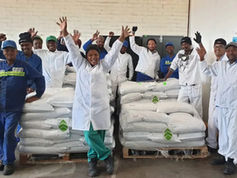The Gulf's Energy Transition- 2025 Review: Part 3
- Khalid Alhindi

- Jul 14, 2025
- 4 min read
How Oil & Gas Infrastructure Can be Repurposed Towards an Energy Transition Strategy — Sulfur
Sulfur is traditionally viewed as a low-value byproduct of oil refining and is largely stockpiled or exported for fertilizer production. However, this element is increasingly being considered as a key enabler for next-generation batteries. With some of the world's largest sulfur reserves and production volumes, the Gulf is uniquely positioned to turn this underutilized resource into a strategic advantage.
Unlike conventional lithium-ion batteries, lithium-sulfur (Li-S) batteries are essentially free from nickel and cobalt and use more widely available, cheaper materials. They are also lighter and offer significantly higher energy density, delivering three to five times more energy per kg of cathode material.
As Saudi Arabia, the UAE, and Oman accelerate lithium extraction, including from oilfield and desalination brines [see part 2], sulfur offers a complementary opportunity to build domestic supply chains for Li-S batteries that align with circular economy goals and future mobility ambitions.
German startup Theion is positioning itself at the forefront of this transition. With patented crystal-based sulfur cathodes, the company opened a UAE-based office in 2024 and is exploring regional production.
Speaking to Al Arabiya in March 2025, Theion CFO, Matthias Fengler highlighted the synergy between Saudi’s resources and Li-S technology. "With the Aramco–Ma’aden lithium venture and vast sulfur resources, the Kingdom has domestic access to all necessary minerals, enabling a sustainable battery manufacturing industry".
Given their favourable energy-to-weight ratio, Li-S batteries are gaining momentum in sectors such as aviation, defence, and freight, where lithium-ion systems struggle.
The UAE, Saudi Arabia, and Oman are all exploring and hosting developments in urban air mobility. In early July 2025, Joby Aviation and Archer both conducted their first electric air taxi test flights in the Emirates. Austria's FlyNow Aviation, which recently opened an office in Riyadh, showcased its first untethered test flights of the "eCopter" in mid-June 2025. This was followed by an announcement two weeks later of a €35 million agreement with Dubai-based helicopter operator Mavi Air for the future delivery of 100 eCopters. Meanwhile, Oman-based hybrid-electric aircraft developer AeroVecto has also entered the race, announcing a strategic partnership in June 2025 with LYNEports, a specialist in air mobility infrastructure simulation and route optimization.
As electric aviation leaders grow, currently primarily relying on lithium-ion batteries, energy density becomes a key bottleneck, and opportunities for next-generation technologies emerge.
In May 2025, Lyten announced the launch of a national defence-focused program to deploy US-made Li-S batteries for advanced drone propulsion. Similarly, in late June 2025, Australia-based Li-S Energy signed a collaboration agreement to supply Li-S batteries for testing with a major defence technology company.
Despite these milestones and the growing enthusiasm, pilot Li-S cells still struggle with some challenges, primarily with cycle life and scalable manufacturing, keeping most commercial efforts in early stages. Innovators working on solid-state electrolytes and polysulfide shuttle suppressors are hoping to close the gap between lab prototypes and commercial viability.
Moreover, it should be emphasized that more than 80% of global sulfur production today comes from oil and gas desulfurization. In April 2025, Saudi Aramco awarded KBR-AMCDE a significant contract to modernize units at gas plants to raise sulfur recovery efficiency from 95% to 99.9% and cut sulfur dioxide emissions by approximately 94%.
But this link to fossil fuel infrastructure introduces a long-term risk. Some studies also warn of a potential sulfur shortage as global refining slows under climate policy, affecting fertilizers and clean-tech applications. Besides use for fertilizers, sulfuric acid is also vital for extracting critical minerals like cobalt and nickel.
While Li-S batteries currently benefit from fossil-derived sulfur abundance, they are not structurally dependent on it. In the long term, sulfur can be sourced from non-fossil pathways, most notably through metal smelting, particularly from copper and zinc refining, where sulfuric dioxide is captured and converted into sulfuric acid. This can then be processed into high-purity elemental sulfur that is suitable for battery applications.
Furthermore, according to the US Geological Survey, an "almost limitless" quantity of sulfur is locked in the sulfate minerals gypsum and anhydrite. However, the report also highlights that direct extraction from these sources demands the development of economically feasible methods.
A study published in The Royal Geographical Society, led by researchers at UCL’s Department of Risk and Disaster Reduction, claims that the world could face what the authors call a "dirty, toxic, destructive" turn toward direct sulfur mining as a result of energy decarbonisation. They urge early international coordination and investment in cleaner extraction methods from sulfate mineral deposits to avoid threatening food security and destabilising critical material supply chains.
Nonetheless, Li-S batteries could still present a strategically timed opportunity in favor of a clean energy transition. By leveraging current surpluses, the Gulf could get ahead of this shift by positioning sulfur as a clean-tech material and as a constituent of domestic battery ecosystems that support regional circular economy goals, reduce exposure to volatile global metal markets, and strengthen technological sovereignty.
However, as with lithium extraction from oilfield brines, repurposing outputs from fossil fuel infrastructure raises valid concerns about reinforcing long-term dependence on oil and gas. Extracting final value from existing petroleum systems while simultaneously laying the groundwork for future cleaner industries is a complex, yet crucial challenge that must be tackled.

Ultimately, no sourcing pathway is perfectly clean. The goal is to make the most intelligent possible choices from available options. This means prioritizing solutions that are lower in carbon intensity, economically viable, scalable, ethically sound, and geopolitically just. In this context, sulfur and Li-S batteries could play a pivotal role in building more resilient and balanced approaches for the Gulf’s energy transition.












Comments